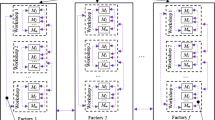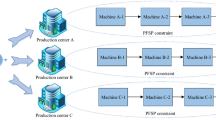Abstract
With the deepening of economic globalization and the development of the manufacturing industry, distributed manufacturing patterns have become a popular topic in current production research. In the background of distributed shop scheduling, process planning problems in different factories are considered integrally with scheduling problems to utilize the heterogeneous machining resources of distributed factories. To address actual production problems more concretely, this paper investigates the multiobjective distributed integrated process planning and scheduling (MODIPPS) problem to minimize makespan, maximum machine load, and total machine load, and it establishes a mixed-integer linear programming (MILP) model. In addition, by designing a new encoding method based on the OR-nodes of the process network graph, this paper proposes a multiobjective memetic algorithm (MOMA) to solve the problem. The proposed MOMA can guarantee the feasibility of individuals by several specially designed genetic operators so that the process precedence constraints in the network graph are satisfied in the whole algorithm period. Furthermore, the algorithm introduces a simulated annealing (SA) mechanism to avoid falling into a local optimum by accepting relatively poor individuals with a certain probability. Finally, through comparison experiments on benchmarks, the proposed method shows sufficient effectiveness and superiority in solving MODIPPS problems compared with existing classic multiobjective optimization algorithms.










Similar content being viewed by others
References
Barzanji R, Naderi B, Begen MA (2019) Decomposition algorithms for the integrated process planning and scheduling problem. Omega 93:102025
Czyzżak P, Jaszkiewicz A (1998) Pareto simulated annealing—a metaheuristic technique for multiple-objective combinatorial optimization. J Multi-Criteria Decis Anal 7(1):34–47
De Giovanni L, Pezzella F (2010) An improved genetic algorithm for the distributed and flexible job-shop scheduling problem. Eur J Oper Res 200(2):395–408
Franca PM, Mendes A, Moscato P (2001) A memetic algorithm for the total tardiness single machine scheduling problem. Eur J Oper Res 132(1):224–242
Jia HZ, Fuh JYH, Nee AYC, Zhang YF (2002) Web-based multi-functional scheduling system for a distributed manufacturing environment. Concurr Eng Res Appl 10(1):27–39
Jin L, Zhang C, Shao X, Yang X, Tian G (2016) A multi-objective memetic algorithm for integrated process planning and scheduling. Int J Adv Manuf Technol 85(5–8):1513–1528
Li H, Xinyu L, Liang G (2021) A discrete artificial bee colony algorithm for the distributed heterogeneous no-wait flowshop scheduling problem. Appl Soft Comput 100:106946
Li X, Gao L, Li W (2012) Application of game theory based hybrid algorithm for multi-objective integrated process planning and scheduling. Expert Syst Appl 39(1):288–297
Li X, Xiao S, Wang C, Yi J (2019) Mathematical modeling and a discrete artificial bee colony algorithm for the welding shop scheduling problem. Memet Comput 11(4):371–389
Li Y, Ba L, Cao Y, Liu Y, Yang M (2015) Research on integrated process planning and scheduling problem with consideration of multi-objectives. China Mech Eng 26(17):2344
Li Y, Li X, Gao L, Meng L (2020) An improved artificial bee colony algorithm for distributed heterogeneous hybrid flowshop scheduling problem with sequence-dependent setup times. Comput Ind Eng 147:106638
Liang J, Wang P, Guo L, Qu B, Yue C, Yu K, Wang Y (2019) Multi-objective flow shop scheduling with limited buffers using hybrid self-adaptive differential evolution. Memet Comput 11(4):407–422
Lin C-S, Li P-Y, Wei J-M, Wu M-C (2020) Integration of process planning and scheduling for distributed flexible job shops. Comput Oper Res 124:105053
Liu Q, Li X, Gao L (2021) Mathematical modeling and a hybrid evolutionary algorithm for process planning. J Intell Manuf 32(3):781–797
Liu Q, Li X, Gao L (2021) A novel MILP model based on the topology of a network graph for process planning in an intelligent manufacturing system. Engineering 7(6):807–817
Liu Q, Li X, Gao L, Li Y (2020) A modified genetic algorithm with new encoding and decoding methods for integrated process planning and scheduling problem. IEEE Trans Cybern 51(9):4429–4438
Liu XJ, Yi H, Ni ZH (2013) Application of ant colony optimization algorithm in process planning optimization. J Intell Manuf 24(1):1–13
Lu C, Gao L, Gong W, Hu C, Li X (2021) Sustainable scheduling of distributed permutation flow-shop with non-identical factory using a knowledge-based multi-objective memetic optimization algorithm. Swarm Evol Comput 60:100803
Meng L, Zhang C, Ren Y, Zhang B, Lv C (2020) Mixed-integer linear programming and constraint programming formulations for solving distributed flexible job shop scheduling problem. Comput Ind Eng 142:106347
Mohammadi G, Karampourhaghghi A, Samaei F (2012) A multi-objective optimisation model to integrating flexible process planning and scheduling based on hybrid multi-objective simulated annealing. Int J Prod Res 50(18):5063–5076
Mohapatra P, Benyoucef L, Tiwari MK (2013) Integration of process planning and scheduling through adaptive setup planning: a multi-objective approach. Int J Prod Res 51(23–24):7190–7208
Mohapatra P, Nayak A, Kumar SK, Tiwari MK (2015) Multi-objective process planning and scheduling using controlled elitist non-dominated sorting genetic algorithm. Int J Prod Res 53(6):1712–1735
Na De Ri B, Ruiz R (2010) The distributed permutation flowshop scheduling problem. Comput Oper Res 37(4):754–768
Okwudire CE, Madhyastha HV (2021) Distributed manufacturing for and by the masses. Science (New York, N. Y.) 372(6540):341–342
Phu-ang A, Thammano A (2017) Memetic algorithm based on marriage in honey bees optimization for flexible job shop scheduling problem. Memet Comput 9(4):295–309
Qin H, Li T, Teng Y, Wang K (2021) Integrated production and distribution scheduling in distributed hybrid flow shops. Memet Comput 13(2):185–202
Raeesi NMR, Kobti Z (2012) A memetic algorithm for job shop scheduling using a critical-path-based local search heuristic. Memet Comput 4(3):231–245
Shen W, Wang L, Hao Q (2006) Agent-based distributed manufacturing process planning and scheduling: a state-of-the-art survey. IEEE Trans Syst Man Cybern Part C Appl Rev 36(4):563–577
Shokouhi E (2018) Integrated multi-objective process planning and flexible job shop scheduling considering precedence constraints. Prod Manuf Res Open Access J 6(1):61–89
Van Veldhuizen DA, Lamont GB (1998) Evolutionary computation and convergence to a pareto front. In: Paper presented at the Late breaking papers at the genetic programming 1998 conference
Wang J-J, Wang L (2020) A knowledge-based cooperative algorithm for energy-efficient scheduling of distributed flow-shop. IEEE Trans Syst Man Cybern Syst 50(5):1805–1819
Wen X, Wang K, Li H, Sun H, Wang H, Jin L (2021) A two-stage solution method based on NSGA-II for green multi-objective integrated process planning and scheduling in a battery packaging machinery workshop. Swarm Evolut Comput 61:100820
Wu X, Liu X, Zhao N (2019) An improved differential evolution algorithm for solving a distributed assembly flexible job shop scheduling problem. Memet Comput 11(4):335–355
Ying K-C, Lin S-W (2018) Minimizing makespan for the distributed hybrid flowshop scheduling problem with multiprocessor tasks. Expert Syst Appl 92:132–141
Zhang S, Yu Z, Zhang W, Yu D, Xu Y (2016) An extended genetic algorithm for distributed integration of fuzzy process planning and scheduling. Math Probl Eng 2016
Zhang S, Yu Z, Zhang W, Yu D, Zhang D (2015) Distributed integration of process planning and scheduling using an enhanced genetic algorithm. Int J Innov Comput Inf Control 11(5):1587–1602
Zhang X, Zhang H, Yao J (2020) Multi-objective optimization of integrated process planning and scheduling considering energy savings. Energies 13(23):6181
Zhang Z, Tang R, Peng T, Tao L, Jia S (2016) A method for minimizing the energy consumption of machining system: integration of process planning and scheduling. J Clean Prod 137:1647–1662
Zhao B, Gao J, Chen K, Guo K (2018) Two-generation Pareto ant colony algorithm for multi-objective job shop scheduling problem with alternative process plans and unrelated parallel machines. J Intell Manuf 29(1):93–108
Zhao F, Zhao L, Wang L, Song H (2020) An ensemble discrete differential evolution for the distributed blocking flowshop scheduling with minimizing makespan criterion. Expert Syst Appl 160:113678
Zitzler E, Deb K, Thiele L (2000) Comparison of multiobjective evolutionary algorithms: empirical results. Evol Comput 8(2):173–195
Acknowledgements
This work is supported in part by the National Key R&D Program of China under Grant No. 2019YFB1704600, in part by the National Natural Science Foundation of China under Grant Nos. 51825502 and U21B2029, and in part by the Program for HUST Academic Frontier Youth Team under Grant 2017QYTD04.
Author information
Authors and Affiliations
Corresponding author
Ethics declarations
Conflict of interest
Qihao Liu, Xinyu Li, Liang Gao declare that they have no conflict of interest or financial conflicts to disclose.
Additional information
Publisher's Note
Springer Nature remains neutral with regard to jurisdictional claims in published maps and institutional affiliations.
Rights and permissions
About this article
Cite this article
Liu, Q., Li, X., Gao, L. et al. A multiobjective memetic algorithm for integrated process planning and scheduling problem in distributed heterogeneous manufacturing systems. Memetic Comp. 14, 193–209 (2022). https://doi.org/10.1007/s12293-022-00364-x
Received:
Accepted:
Published:
Issue Date:
DOI: https://doi.org/10.1007/s12293-022-00364-x




